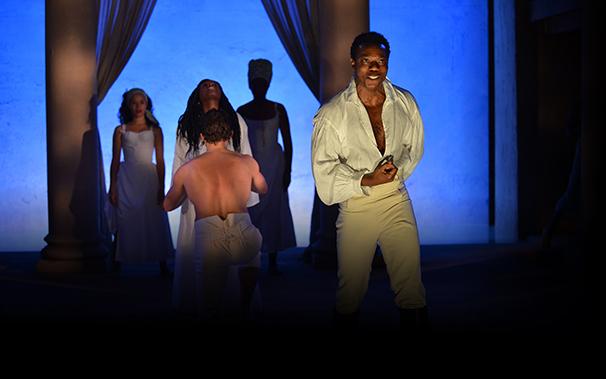
Marc Antony and Cleopatra are placed among history’s greatest lovers. Their tragic story is as famous as Romeo and Juliet’s, Samson and Delilah’s or Lancelot and Guinevere’s. However, Shakespeare’s portrayal of the couple is heavy on politics as well as love, focusing largely on the conflict between Egypt and Rome.
Tarell Alvin McCraney’s production of “Antony and Cleopatra,” which opened at the Public Theater on March 5, successfully accomplishes the difficult task of balancing this famous love story with the cultural and political gap between the title characters.
McCraney’s play opens in a palpably African Egypt. Rather than giving the audience the sleek robes and kohl eyeliner stereotypically associated with a semi-Caucasian Egypt, McCraney’s Egypt feels far more natural. Joaquina Kalukango, who plays a dominating yet petite Cleopatra, has dreadlocks rather than the black wig commonly associated with the character.
In contrast, the Romans have been Anglicized. They wear military jackets rather than togas and would not appear out of place in a textbook about the American Revolution. Luckily, the play’s action occurs predominantly in Egypt, which is the far more interesting culture to observe, full of music and passion.
Chivas Michael, an actor who plays several Egyptian roles, exemplifies this passion. Although his three parts are not distinct enough to differentiate one character from another, he carries the Egyptian culture with him even when he leaves the country, accompanying Antony to Rome as the two nations fight.
By making this cultural divide so jarring, McCraney is better able to illustrate Antony’s inner struggle. Antony is unsure whether his allegiances lie with Rome or with Cleopatra, the woman he loves and the face of Egypt. As played by Jonathan Cake, Antony is both wild and shrewd, giving in to passion when he is with Cleopatra but succumbing to political cunning when in Rome. Cake is excellent — his charisma is exactly what Antony needs.
He is paired perfectly with Kalukango’s Cleopatra, who, despite being nearly a foot shorter than Cake, manages to match his incredible presence. For her, love and politics are intertwined. Her two goals — to empower Egypt and to love Antony — go together in her mind. Kalukango is appropriately fiery and commanding, as a queen should be. Together, these characters embody the archetypical power couple, equally obsessed with each other and their countries’ politics.
Although we are left with Antony and Cleopatra’s dramatic love-induced suicides, the politics of the play linger over the characters. The pair was infamous for being lovers, but the drama of their affair was forced to compete with the critical conflict between their two nations. Happily, this production will not make audiences choose. Instead, it weaves the two narratives together in a beautifully crafted presentation of this famous tale.
“Antony and Cleopatra” is playing at the Public Theater, 425 Lafayette St., through March 23.
A version of this article appeared in the Thursday, March 6 print edition. Dylan Jarrett is books/theater editor. Email her at [email protected].






















































































































































